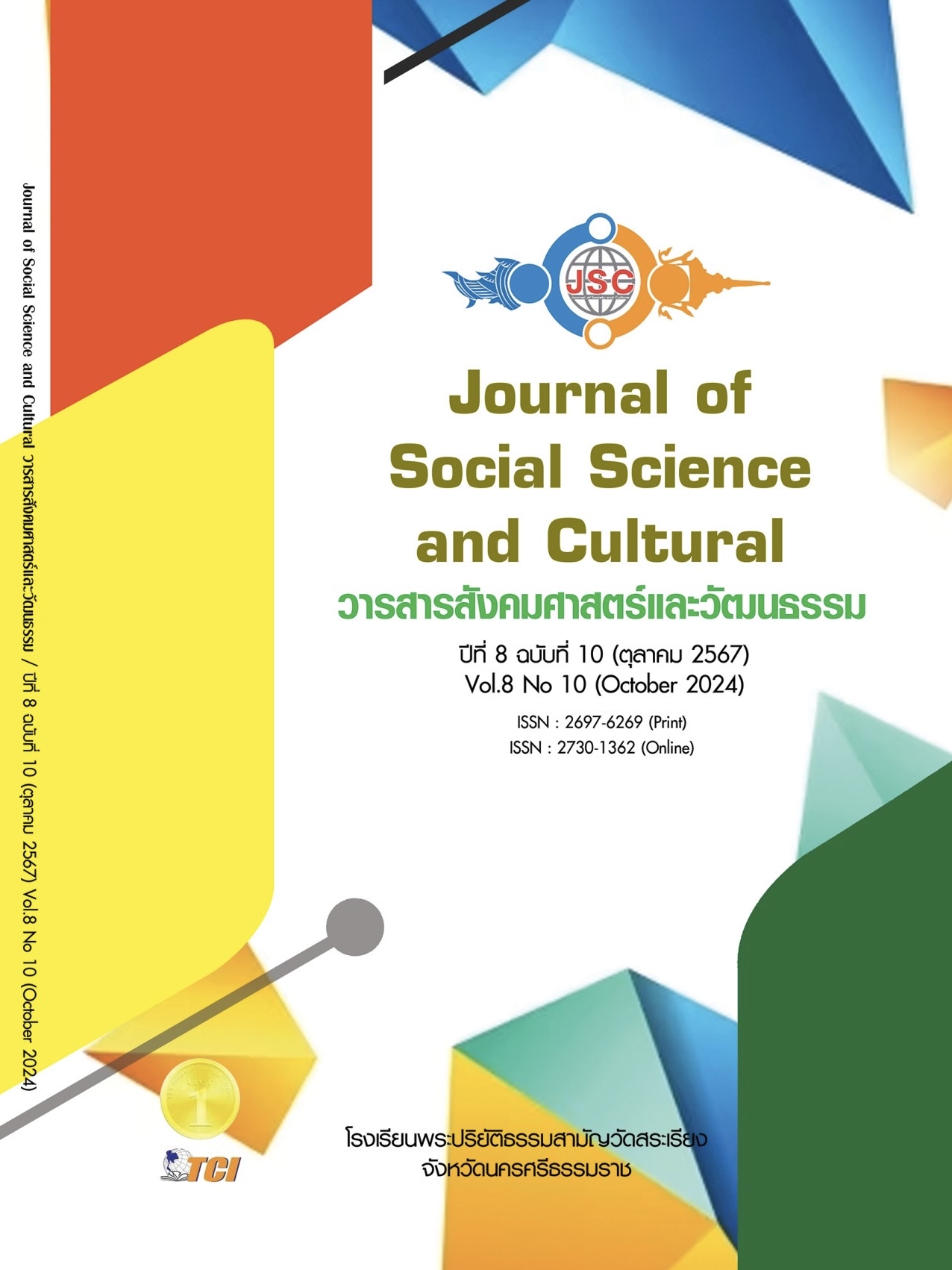THE DEVELOPMENT MODEL OF DIGITAL LEADERSHIP FOR SCHOOL ADMINISTRATORS UNDER THE OFFICE OF THE BASIC EDUCATION COMMISSION IN THE INSPECTION REGION NO.5
Main Article Content
Abstract
The objectives of this study were 1) To study the elements of digital leadership of basic education administrators in Inspectorate Region 5, 2) To create a model for the development of digital leadership of basic education administrators in Inspectorate Region 5, and 3) To evaluate the digital leadership development model of basic education administrators in Inspectorate Region 5. The methodology used in this study was Mixed Method and was divided into three phases. 1) On the analysis the elements of digital leadership of basic education administrators in Inspectorate Region 5, the researcher examines the documents, concepts and theories. Interview was the research tool to find out the components of the digital leadership elements of basic education administrators in the 5th Inspectorate Region 5 and analyze the data in the Confirmation Factor Analysis to survey key elements from a sample of 360 population. 2) To create the digital leadership model of basic education administrators in the 5th Inspectorate Region interview was the research tool which used to evaluate the significance from 9 specialists. In order to measure the suitability of the model. 3) To assess the digital leadership model of basic education administrators in the 5th Inspectorate Region, the connoisseurship was used among 9 informants for accuracy, suitability, possibility and benefits. The results showed that: 1) The digital leadership elements of basic education administrators in the 5th Inspectorate Region consist of 5 main components: creating a digital vision with 3 sub-components, digital literacy with 4 sub-components, digital technology use ability with 3 sub-components, creating a digital learning culture with 4 sub-components, and ethics in using digital technology with 3 sub-components. 2) The digital leadership model of basic education administrators in the 5th Inspectorate Region consists of the following: Principles, Objectives, Content, Process, Measurement and Evaluation Description, conditions for success and expected results. 3) The results of the evaluation and certification of the digital leadership model of basic education administrators in the 5th Inspectorate Region in terms of accuracy, appropriateness, It meets the evaluation criteria as prescribed. Therefore, it can be concluded that experts
Article Details
References
กนกอร สมปราชญ์. (2562). ภาวะผู้นำกับคุณภาพการศึกษา. ขอนแก่น: โรงพิมพ์มหาวิทยาลัยขอนแก่น.
จิณณวัตร ปะโคทัง. (2561). ภาวะผู้นำยุคดิจิทัลสำหรับผู้บริหารสถานศึกษามืออาชีพ. อุบลราชธานี: มหาวิทยาลัยราชภัฏอุบลราชธานี.
จิติมา วรรณศรี. (2564). รูปแบบการพัฒนาภาวะผู้นำของผู้บริหารสถานศึกษายุคดิจิทัล. วารสารสังคมศาสตร์และมนุษยวิทยาเชิงพุทธ, 6(10), 460-471.
ชูชาติ พุทธลา. (2561). องค์ประกอบของภาวะผู้นำทางดิจิทัลสำหรับผู้บริหารโรงเรียนสังกัดสำนักงานเขตพื้นที่การศึกษาประถมศึกษาจังหวัดหนองบัวลำภู. ใน วิทยานิพนธ์ศึกษาศาสตร์มหาบัณฑิต สาขาการบริหารการศึกษา. มหาวิทยาลัยขอนแก่น.
ไชยา ภาวะบุตร. (2563). หลักทฤษฎีและปฏิบัติการบริหารการศึกษา. (พิมพ์ครั้งที่ 3). สกลนคร: มหาวิทยาลัยราชภัฏสกลนคร.
สำนักงานคณะกรรมการพัฒนาการเศรษฐกิจและสังคมแห่งชาติ. (2562). กรอบสมรรถนะ ด้านดิจิทัลสำหรับพลเมืองไทย. กรุงเทพมหานคร: กระทรวงดิจิทัลเพื่อเศรษฐกิจ และสังคม.
สุกัญญา แช่มช้อย. (2560). ภาวะผู้นำทางเทคโนโลยี: การนำเทคโนโลยีสู่ห้องเรียน และโรงเรียนในศตวรรษที่ 21. วารสารศึกษาศาสตร์ มหาวิทยาลัยนเรศวร, 16(4) 216-224.
สุชาติ ประสิทธิ์รัฐสินธุ์. (2555). อดีต ปัจจุบัน และอนาคตของการวิจัยเชิงคุณภาพ. วารสารการวิจัยการพัฒนาการบริหาร, 5(1), 9-40.
Hair, J. F. et al. (2010). Multivariate data analysis. (7th ed.). New Jersey: Pearson Educational International.
Kahintapongs, S. (2020). Renewable Energy Policy Development in Thailand. International Journal of Multidisciplinary in Management and Tourism, 4(2), 148-155.
Likert, R. (1967). The Method of Constructing and Attitude Scale. New York: Wiley & Son.


